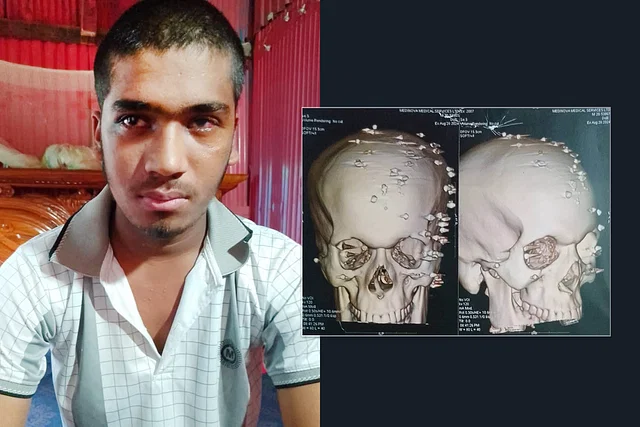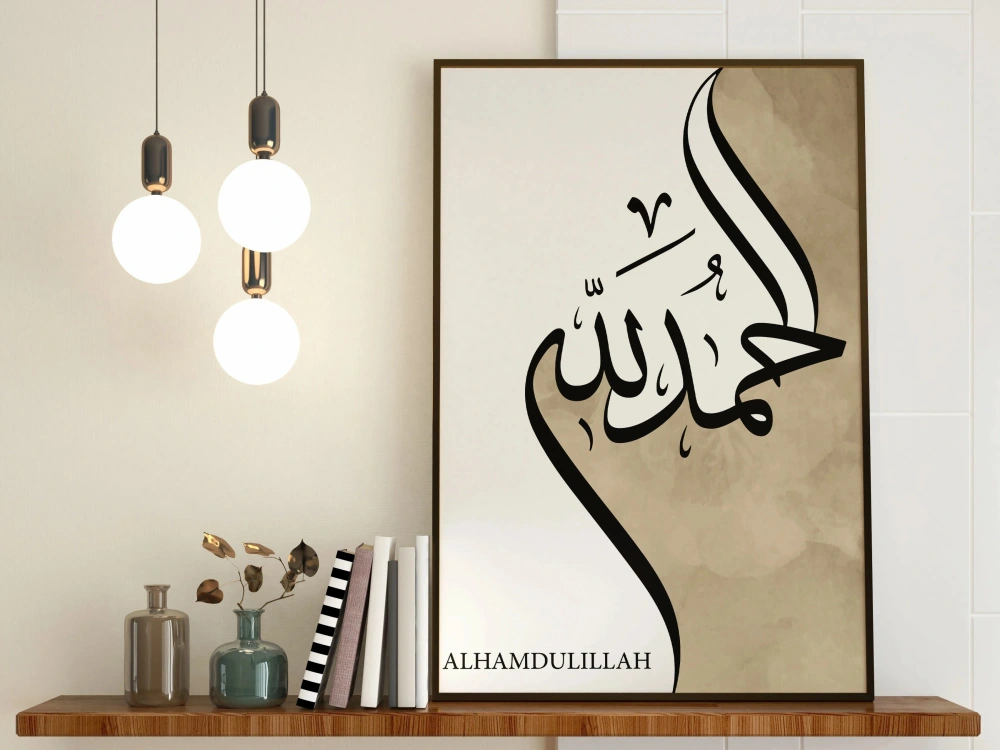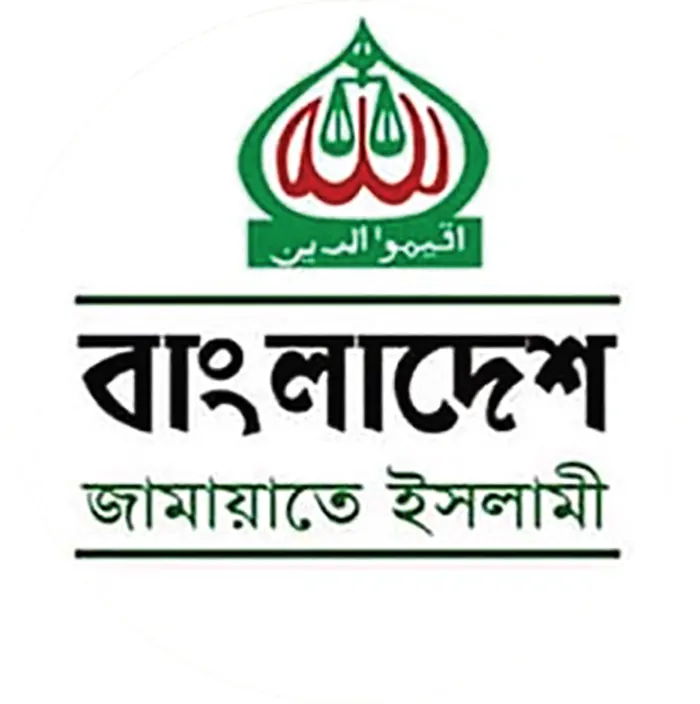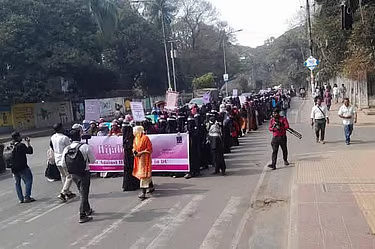Anik Howlader (20) was unable to continue his education beyond the eighth grade due to financial constraints. As a result, he had to work alongside his brothers to support the family. While he has friends who are still pursuing their studies, they encouraged him to participate in the student movement that took place last July.
Responding to his friends’ call, Anik joined the movement on July 18. Unfortunately, that day, he sustained injuries from police gunfire. Anik reported that he was struck by bullets in his eyes, face, and head, leading to severe damage in both eyes. He experiences only dim vision in one eye and is uncertain about the prognosis for the other. In addition, he suffers from significant head pain, making it extremely difficult for him to sleep.
Anik resides in Madaripur Sadar with his father, Nurul Islam, who has four sons and three daughters. Anik is the third of the four sons, while his sisters live with their husbands. Nurul, a rickshaw driver, is no longer able to drive as he once did due to his age. Consequently, the family relies on the sons for financial support, but not all of them have a steady income, as they work various jobs such as masons and helpers in goods delivery. A few years ago, Anik took a position with an ice cream company, handling deliveries.
In mid-July, a nationwide movement emerged demanding reforms to the quota system in government jobs. On July 17, students protested in Madaripur, where leaders and activists of the Awami League and its affiliated organizations violently suppressed the demonstrations. On the same day, students protested in several regions across the country, including Dhaka. Anik viewed various videos documenting the suppression of these protests, which prompted his student friends to invite him to join the movement. Unable to refuse their request, Anik participated.
Recalling the events of July 18, Anik explained that around 10 a.m., he gathered with students from various educational institutions at the UI School area in the heart of Madaripur city. They intended to march towards the DC Bridge area, where Awami League, Youth League, and Chatra League members were already positioned to suppress the protests. Tensions escalated, and police joined the effort to quell the demonstrations, leading to a chaotic confrontation. Police fired rubber bullets and tear gas, prompting students to flee in all directions.
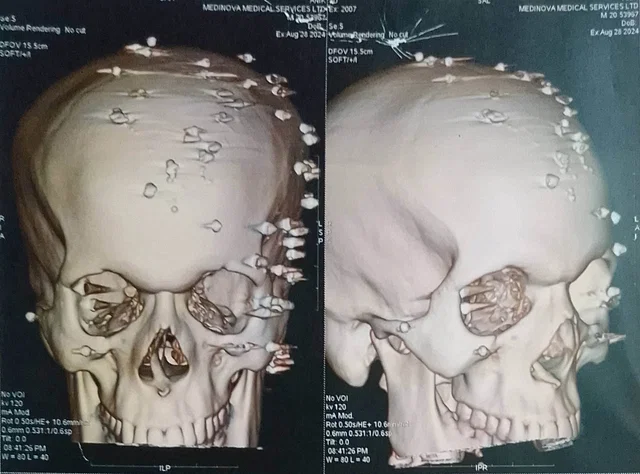
Anik ran toward the Madaripur passport office, where he noticed police officers on the roof of a nearby building. Suddenly, a group of policemen confronted him. He recounted, “Before I could comprehend the situation, the police shot at me from close range.”
Anik continued, “The first bullet hit my eye. After that, I lost sight of everything, but I could feel the shots hitting my head, eyes, and face. I was unable to run and stumbled over something as I walked. Eventually, fellow students transported me to Sadar Hospital.”
Anik faced further difficulties upon arriving at the hospital. He explained that the doctors examined him and advised that he needed to be transferred to Dhaka for specialized care. However, the police initially refused to allow his transfer. After some time, he was permitted to leave after providing his information, having his photograph taken, and filing a case.
Anik stated, “There was some kind of trouble in the old market of Madaripur Sadar, and a case was filed against me regarding that incident. However, I did not participate in that event.”
During the turbulent period in July, communication with other districts of Dhaka was nearly severed. Anik was taken to Faridpur Medical College Hospital on July 19, where he was advised to continue his treatment in Dhaka.
The following day, Anik was admitted to the National Institute of Ophthalmology and Hospital in the capital. The doctors informed him that both of his eyes had sustained severe damage, necessitating surgical intervention. He later began receiving treatment at the Bangladesh Eye Hospital in the capital, where he underwent surgery on his right eye. Although he can now see dimly through that eye, he has lost direct vision. The prognosis for his left eye remains uncertain.
Dr. Niaz Abdur Rahman, the managing director and surgeon at Bangladesh Eye Hospital, was involved in Anik’s treatment. He confirmed that Anik received his care free of charge and stated in an interview that the bullets struck Anik’s eyes, penetrating the cornea and entering the orbit (eye socket). Both eyes were severely damaged, with a significant amount of blood clots and damage in the center of the right eye, reducing the likelihood of regaining clear vision. He may see dimly from the periphery of that eye, while the left eye’s condition is critical and requires a corneal transplant, necessitating a donor. Additionally, Anik has a bullet lodged in his skull, which will require the attention of a neurologist.
Anik was referred to the National Institute of Neurosciences and Hospital in the capital on August 17. Following the doctor’s advice, he underwent an X-ray of his entire face, including his head.
Prothom Alo showed this X-ray image to a doctor in the neurology department of Dhaka Medical College Hospital. The doctor, who preferred to remain anonymous, noted that the X-ray revealed multiple injuries in the skull, indicating the possible presence of metal fragments.
Prothom Alo asked a police officer about the possible nature of the bullet after showing the details of the incident, the condition of the patient and the X-ray image. This police officer, who did not wish to reveal his name, told Prothom Alo that this can happen due to the impact of the shotgun cartridge (lead ball). They go inside if thrown from close range. Then they cannot be removed without surgery.
Anik’s father, Nurul Islam, revealed that he borrowed 50,000 taka with interest to take his son to Dhaka for treatment. He also mentioned that they later received some assistance from the anti-discrimination student movement, political parties, and several non-governmental organizations for Anik’s medical care. However, they have already incurred substantial expenses related to Anik’s treatment and care.
Anik expressed his concerns, stating, “There is a lot of trouble. I don’t know what will happen to my eyes. Additionally, when I go to sleep at night with this headache, it becomes unbearable. My head feels heavy, and I require better treatment.”

